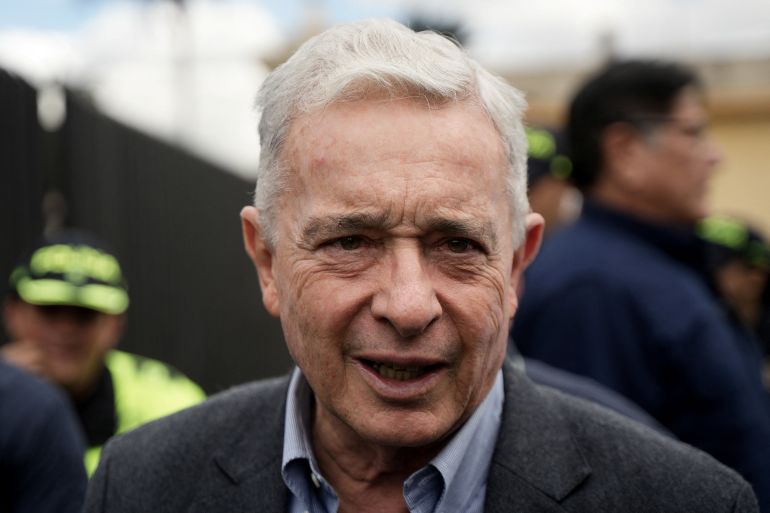Colombian appeals court strikes down ex-President Uribe’s conviction
Alvaro Uribe had previously been found guilty of asking paramilitary members to lie about their alleged links to him.

By Abby Rogers and News Agencies
Published On 21 Oct 202521 Oct 2025
Save
A court in Colombia has overturned ex-President Alvaro Uribe’s convictions for fraud and bribery, setting the stage for further appeals in the closely watched case.
On Tuesday, two magistrates on a panel of three voted to toss the verdict against the 73-year-old Uribe, arguing that there were “structural deficiencies” in the previous ruling, including insufficient evidence.
Recommended Stories
list of 3 itemsend of list
Uribe’s conviction had marked the first time in Colombia’s history that a former president was convicted of a crime and sentenced.
A right-wing politician who governed as president from 2002 to 2010, Uribe was found guilty in July of asking paramilitary members to lie about alleged links to him.
Uribe has long maintained his innocence. But Tuesday’s decision has prompted an outpouring of opposition from those who believe it reflects a lax attitude towards right-wing abuses.
“This is how the history of paramilitary governance in Colombia is covered up,” Gustavo Petro, the country’s current president, wrote on social media. “That is, the history of the politicians who came to power allied with drug trafficking and who unleashed the genocide in Colombia.”
Uribe had been sentenced in August to 12 years of house arrest, a fine of $578,000 and a ban from serving in public office for 100 months and 20 days — or just more than eight years.
Senator Ivan Cepeda, one of the central figures in the Uribe case, has already announced he plans to challenge the magistrates’ decision.
“We will file an appeal for cassation before the Supreme Court of Justice,” Cepeda wrote on social media.
Suspected ties to paramilitaries
Tuesday’s ruling was the latest chapter in a years-long case that has exacerbated political divides in Colombia.
Advertisement
Uribe is a controversial leader in the South American country, which has struggled with more than six decades of internal conflict between government forces, left-wing rebels, right-wing paramilitaries and criminal networks.
During his time in office, Uribe unleashed an iron-fisted military offensive against the country’s left-wing rebel groups.
Critics have accused his government of turning a blind eye to massacres that unfolded in the process — and, in some cases, encouraging soldiers to murder civilians to artificially boost the number of rebels killed.
Uribe’s ties to right-wing paramilitaries before his time as president have also come under scrutiny.
In 2012, Senator Cepeda had launched a probe into the ex-president’s alleged connections with paramilitaries like the Bloque Metro, particularly during his ascent to political power in the 1990s.
Uribe responded with a libel complaint against Cepeda, accusing the left-wing senator of manipulating paramilitary members to be witnesses.
But when the case reached the Supreme Court in 2018, its judges came to a surprise decision. It tossed the case against Cepeda and instead called for an investigation into Uribe on the same charge, witness tampering.
Uribe admitted he had sent his lawyers to visit paramilitary members in prison, but he denied conspiring to coax the three witnesses into changing their testimony, as had been alleged.
In July, Judge Sandra Liliana Heredia ruled there was enough evidence to determine that Uribe had conspired with a lawyer to manipulate the witnesses. Her ruling was overturned in Tuesday’s decision.
Influence on Colombia’s election
What happens next in the case could weigh heavily on Colombia’s upcoming presidential election, slated to unfold in May 2026. Uribe remains a popular figure in Colombian politics.
His case has also caught the attention of United States President Donald Trump, whose administration has been supportive of right-wing leaders facing prosecution in Latin America.
Trump has repeatedly accused the judicial system, both in the US and in Latin America, of bias against conservative voices.
“Uribe’s only crime has been to tirelessly fight and defend his homeland. The weaponisation of Colombia’s judicial branch by radical judges has now set a worrisome precedent,” US Secretary of State Marco Rubio posted on X earlier this year, after Uribe was found guilty.
Petro, the country’s first left-wing president, is term-limited and will not be able to run in the 2026 race.
In a social media post, Petro speculated that Tuesday’s decision would create pathways for Trump to increase his influence in Colombia, by allying with Uribe’s supporters.
Advertisement
Petro has been feuding with the Trump administration over tariffs and differences over policies to combat illicit drugs.
“Now Trump, allied with these politicians and with Uribe, will seek sanctions against the president who denounced in his life the alliances between Colombian political power and paramilitary drug trafficking in Colombia, and he does so with the help of those who helped paramilitarism in the country,” Petro posted on X.
Uribe’s party, Democratic Center, has already said that Uribe will run for senator if his legal situation allows it.
Al Jazeera correspondent Alessandro Rampietti also noted that Senator Cepeda has signalled his candidacy for president in the upcoming race.
“There’s no doubt that this will change or will have big repercussions in the upcoming election campaign in the country, but also, this is not the last word,” Rampietti explained from Bogota.
“We can expect the victims of this case to appeal to the Supreme Court, and the Supreme Court will have probably five years to make a final decision.”
